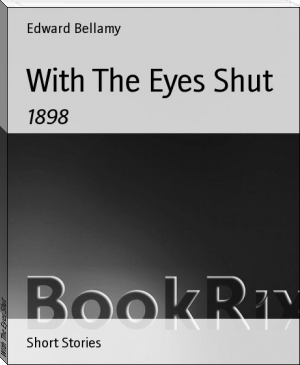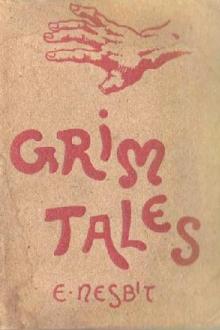The Old Folks' Party - Edward Bellamy (100 books to read txt) 📗

- Author: Edward Bellamy
Book online «The Old Folks' Party - Edward Bellamy (100 books to read txt) 📗». Author Edward Bellamy
"And now what shall we do next Wednesday evening?" said Jessie Hyde, in a business-like tone. "It is your turn, Henry, to suggest."
Jessie was a practical, energetic young lady, whose blue eyes never relapsed into the dreaminess to which that color is subject. She furnished the "go" for the club. Especially she furnished the "go" for Henry Long, who had lots of ideas, but without her to stir him up was as dull as a flint without a steel.
There were six in the club, and all were present to-night in Jessie's parlor. The evening had been given to a little music, a little dancing, a little card-playing, and a good deal of talking. It was near the hour set by the club rule for the adjournment of its reunions, and the party had drawn their chairs together to consult upon the weekly recurring question, what should be done at the next meeting by way of special order of amusement. The programmes were alternately reading, singing, dancing, whist; varied with evenings of miscellaneous sociality like that which had just passed. The members took turns in suggesting recreations. To-night it was Henry Long's turn, and to him accordingly the eyes of the group turned at Jessie's question.
"Let's have an old folks' party," was his answer.
Considering that all of the club were yet at ages when they celebrated their birthdays with the figure printed on the cake, the suggestion seemed sufficiently irrelevant.
"In that case," said Frank Hays, "we shall have to stay at home."
Frank was an alert little fellow, with a jaunty air, to whom, by tacit consent, all the openings for jokes were left, as he had a taste that way.
"What do you mean, Henry?" inquired George Townsley, a thick-set, sedate young man, with an intelligent, but rather phlegmatic look.
"My idea is this," said Henry, leaning back in his chair, with his hands clasped behind his head, and his long legs crossed before him. "Let us dress up to resemble what we expect to look like fifty years hence, and study up our demeanor to correspond with what we expect to be and feel like at that time, and just call on Mary next Wednesday evening to talk over old times, and recall what we can, if anything, of our vanished youth, and the days when we belonged to the social club at C------."
The others seemed rather puzzled in spite of the explanation. Jessie sat looking at Henry in a brown study as she traced out his meaning.
"You mean a sort of ghost party," said she finally; "ghosts of the future, instead of ghosts of the past."
"That's it exactly," answered he. "Ghosts of the future are the only sort worth heeding. Apparitions of things past are a very unpractical sort of demonology, in my opinion, compared with apparitions of things to come."
"How in the world did such an odd idea come into your head?" asked pretty Nellie Tyrrell, whose dancing black eyes were the most piquant of interrogation points, with which it was so delightful to be punctured that people were generally slow to gratify her curiosity.
"I was beginning a journal this afternoon," said Henry, "and the idea of Henry Long, aetat. seventy, looking over the leaves, and wondering about the youth who wrote them so long ago, came up to my mind."
Henry's suggestion had set them all thinking, and the vein was so unfamiliar that they did not at once find much to say.
"I should think," finally remarked George, "that such an old folks' party would afford a chance for some pretty careful study, and some rather good acting."
"Fifty years will make us all not far from seventy. What shall we look like then, I wonder?" musingly asked Mary Fellows.
She was the demurest, dreamiest of the three girls; the most of a woman, and the least of a talker. She had that poise and repose of manner which are necessary to make silence in company graceful.
"We may be sure of one thing, anyhow, and that is, that we shall not look and feel at all as we do now," said Frank. "I suppose," he added, "if, by a gift of second sight, we could see tonight, as in a glass, what we shall be at seventy, we should entirely fail to recognize ourselves, and should fall to disputing which was which."
"Yes, and we shall doubtless have changed as much in disposition as in appearance," added Henry. "Now, for one, I 've no idea what sort of a fellow my old man will turn out. I don't believe people can generally tell much better what sort of old people will grow out of them than what characters their children will have. A little better, perhaps, but not much. Just think how different sets of faculties and tastes develop and decay, come into prominence and retire into the background, as the years pass. A trait scarcely noticeable in youth tinges the whole man in age."
"What striking dramatic effects are lost because the drama of life is spun out so long instead of having the ends brought together," observed George. "The spectators lose the force of the contrasts because they forget the first part of every role before the latter part is reached. One fails in consequence to get a realizing sense of the sublime inconsistencies of every lifetime."
"That difficulty is what we propose, in a small way, to remedy next Wednesday night," replied Henry.
Mary professed some scruples. It was so queer, she thought it must be wrong. It was like tempting Providence to take for granted issues in his hands, and masquerade with uncreated things like their own yet unborn selves. But Frank reminded her that the same objection would apply to any arrangement as to what they should do next week.
"Well, but," offered Jessie, "is it quite respectful to make sport of old folks, even if they are ourselves?"
"My conscience is clear on that point," said Frank. "It's the only way we can get even with them for the deprecating, contemptuous way in which they will allude to us over their snuff and tea, as callow and flighty youth, if indeed they deign to remember us at all, which is n't likely."
"I 'm all tangled up in my mind," said Nellie, with an air of perplexity, "between these old people you are talking about and ourselves. Which is which? It seems odd to talk of them in the third person, and of ourselves in the first. Are n't they ourselves too?"
"If they are, then certainly we are not," replied Henry. "You may take your choice.
"The fact is," he added, as she looked still more puzzled, "there are half-a dozen of each one of us, or a dozen if you please, one in fact for each epoch of life, and each slightly or almost wholly different from the others. Each one of these epochs is foreign and inconceivable to the others, as ourselves at seventy now are to us. It's as hard to suppose ourselves old as to imagine swapping identities with another. And when we get old it will be just as hard to realize that we were ever young. So that the different periods of life are to all intents and purposes different persons, and the first person of grammar ought to be used only with the present tense. What we were, or shall be, or do, belongs strictly to the third person."
"You would make sad work of grammar with that notion," said Jessie, smiling.
"Grammar needs mending just there," replied Henry. "The three persons of grammar are really not enough. A fourth is needed to distinguish the ego of the past and future from the present ego, which is the only true one."
"Oh, you're getting altogether too deep for me," said Jessie. "Come, girls, what in the world are we going to get to wear next Wednesday?"
"Sure enough!" cried they with one accord, while the musing look in their eyes gave place to a vivacious and merry expression.
"My mother is n't near as old as we 're going to be. Her things won't do," said Nellie.
"Nor mine," echoed Jessie; "but perhaps Mary's grandmother will let us have some of her things."
"In that case," suggested Frank, "it will be only civil to invite her to the party."
"To be sure, why not?" agreed Jessie. "It is to be an 'old folks' party, and her presence will give a reality to the thing."
"I don't believe she 'll come," said George. "You see being old is dead earnest to her, and she won't see the joke."
But Mary said she would ask her anyway, and so that was settled.
"My father is much too large in the waist for his clothes to be of any service to me," said George lugubriously.
But Frank reminded him that this was a hint as to his get-up, and that he must stuff with pillows that the proverb might be fulfilled, "Like father like son."
And then they were rather taken aback by Henry's obvious suggestion that there was no telling what the fashion in dress would be in a. d. 1925, "even if," he added, "the scientists leave us any A. D. by that time," though Frank remarked here that a. d. would answer just as well as _Anno Darwinis_, if worst came to worst. But it was decided that there was no use trying after prophetical accuracy in dress, since it was out of the question, and even if attainable would not suggest age to their own minds as would the elderly weeds which they were accustomed to see.
"It's rather odd, is n't it," said Jessie gravely, "that it did n't occur to anybody that in all probability not over one or two of us at most will be alive fifty years hence."
"Let's draw lots for the two victims, and the rest of us will appear as ghosts," suggested Frank grimly.
"Poor two," sighed Nellie. "I 'm sorry for them. How lonely they will be. I'm glad I have n't got a very good constitution."
But Henry remarked that Jessie might have gone further and said just as truly that none of them would survive fifty years, or even ten.
"We may, some of us, escape the pang of dying as long as that," said he, "but that is but a trifle, and not a necessary incident of death. The essence of mortality is change, and we shall be changed. Ten years will see us very different persons. What though an old dotard calling himself Henry Long is stumping around fifty years hence, what is that to me? I shall have been dead a half century by that time."
"The old gentleman you speak so lightly of will probably think more tenderly of you than you do of him," said Jessie.
"I don't believe it," answered Henry. "In fact, if we were entirely true to nature next Wednesday, it would spoil the fun, for we probably should not, if actually of the age we pretend, think of our youth once a year, much less meet to talk it over."
"Oh, I don't think so," protested Nellie. "I 'm sure all the story-books and poetry say that old folks are much given to reviewing their youth in a pensive, regretful sort of way."
"That's all very pretty, but it





Comments (0)